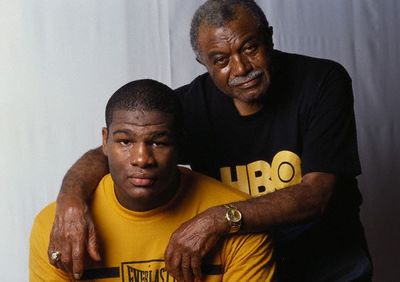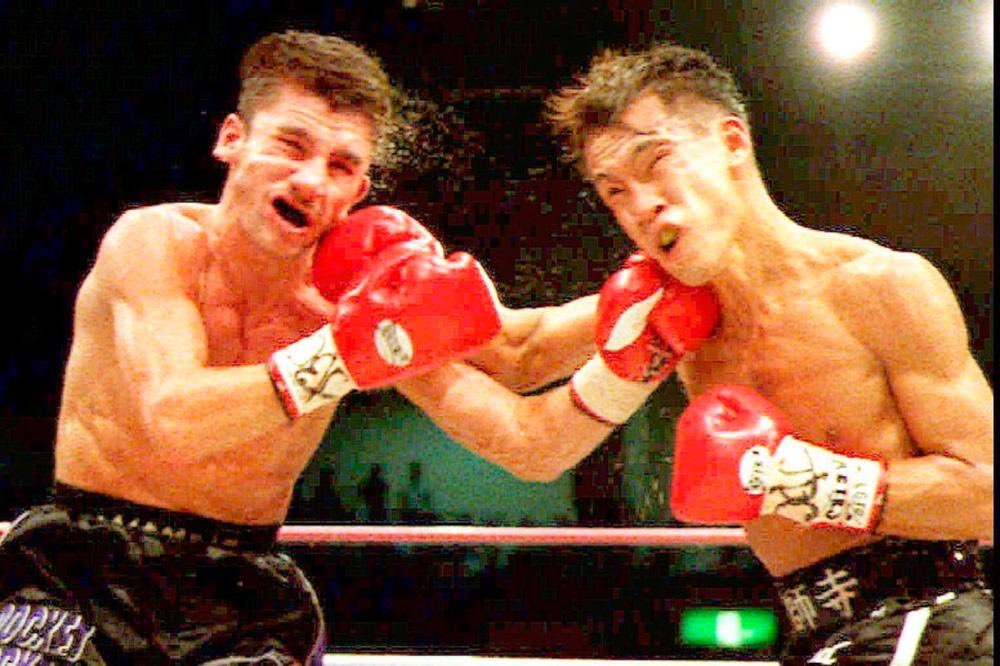One hundred and nine years ago today, in the anonymous Mississippi town of Hillsboro, perhaps the greatest boxing trainer to ever draw breath was born.
Eddie Futch’s dreams of a professional boxing career of his own were stymied by a heart murmur, but the wisdom he imparted to others as a trainer and all-round father figure lives on.
Futch’s legacy is a remarkable one – not only did he train numerous world champions, including Joe Frazier, Ken Norton, Bob Foster, Alexis Arguello, Larry Holmes, Marlon Starling, Mike McCallum and Riddick Bowe, but he also mentored Freddie Roach, widely regarded as one of the best trainers in world boxing today.
Another of Futch’s famous world champion charges was the irrepressible and iron-chinned ‘Pocket Rocket’ – Wayne McCullough.
The Belfast-born former WBC bantamweight champion, now 50 years old, still thinks of Futch often and still feels the pain of his beloved guru’s passing, even though it was nearly 20 years ago.
“It was all down to Eddie Futch,” McCullough told Boxing Social via Transatlantic phone call. “He’s the reason why I became champion of the world. I miss him every day. Even to this day I miss him. I was close to Eddie until he passed away at 90.”
As McCullough speaks of the old maestro, his words and sentiments resonate with warmth and love.
“The stuff he taught me was priceless. People used to say to me, ‘Why did you leave Ireland?’ and I’d say, ‘Two words. Eddie Futch’.
“Just those two words. And, as they say, the rest was history. I learned from the best coach who ever lived and now I can pass that on to other fighters.”
It was after McCullough won a silver medal at bantamweight at the 1992 Olympics in Barcelona that Futch first entered his life.
“I couldn’t fight for six months after the Olympics,” McCullough recalls. “My cheekbone was so damaged I couldn’t fight. So I sat back and waited for offers to turn pro. I really thought I’d be staying in Belfast, I really did.
“The next thing that happened is in November that year I got a call from a guy called Mat Tinley who became my manager. He was a TV executive. He flew over to Dublin to meet me at a function I was at. He told me I was going to be training with Eddie Futch. I was like, ‘What?’
“I was completely star-struck. I used to read all the boxing magazines and stuff. I knew he’d trained Joe Frazier and Ken Norton. I couldn’t believe this guy, this legend, was going to take me on.
“He was 82 years old and the story was he was going to retire. He had Riddick Bowe and Mike McCallum but then he had a look at me at the Olympics and said, ‘That kid has it’. So I came to Las Vegas in February 1993 and started training with Eddie.”

pinnacle of the heavyweight division. Photo: HBO.
McCullough admits that working with Futch “was like Christmas day every day for me”.
“I couldn’t believe this guy had taken me on,” he adds. “He made me into a pro. He made me sit down better on my punches. He made me hit harder and have a better defence. To start with, I was fighting fighters I was meant to beat but I was learning as well. Eddie took me through that process.”
Less than two-and-a-half years after turning over, McCullough was 16-0 and propelled into a WBC world championship fight against Yasuei Yakushiji, the highly-rated Japanese fighter, who had defended the title successfully four times.
“I went to Japan and nobody gave me a prayer,” McCullough recalls. “Eddie did crucial things in training camp. I was fighting a tall guy with a good jab, so he’d make me practise slipping underneath punches and getting away.
“Before the fight, I remember Eddie said to me, ‘Just go out and do what you did in the gym’. He was a tall guy with a good jab. Eddie told me, ‘Jab him to the body, jab him to the head’.
“We won the fight. We had two American judges and a Korean judge. We knew the Korean judge wouldn’t give it to me. But I got justice.”

As McCullough’s experience suggests, Futch’s sense of strategy was masterful.
And nowhere was Futch’s razor sharp boxing brain in better or more famous evidence than before and during the ‘Fight of the Century’ between Muhammad Ali and Joe Frazier in 1971.
In the lead-up to the fight, Futch discerned that Ali was vulnerable to body shots and also identified that when throwing his uppercut he was open to be countered by a left hook.
On these props hung the masterplan that enabled the inspired Frazier to become the first man to defeat ‘The Greatest’.
Besides his sure-footed sense of strategy, Futch also had many other qualities that made him an exceptional trainer, as McCullough explains: “He was so strong. If you didn’t do it his way you were out the door. Eddie was the type of guy who’d say, ‘You don’t want to do it my way, go to another guy’.
“I remember him saying to me one time, ‘Even when you train with me people are gonna whisper in your ear and say you’re doing this or that wrong’. And sure enough it happened.
”One day, I was training in the gym and a guy was trying to convince me to do things differently with Eddie standing on the other side of the gym. He told me that would happen before it happened so I was like, ‘Wow!’ I was taken aback.”
Under Futch’s tutelage McCullough lost just one fight – their 21st and final bout together against Mexican hard-man Daniel Zaragoza – a brilliant brawl for the WBC super-bantam crown, which won ‘Fight of the Year’ recognition from the governing body and many others besides in 1997.
McCullough dropped a split decision, but to this day believes he should have been crowned the winner.
“We got ‘Fight of the Year’ and it was a split decision but we never got the rematch. It was a disappointment,” he said. “It was so gut-wrenching, that first loss. I thought I did enough to win. Two judges thought otherwise.
“Eddie expected there to be a rematch, too. I sat out for a year after that fight and, in that time, Eddie retired. So that was the last time Eddie was in my corner. ”
It could be argued that – without Eddie – McCullough was never quite the same fighter again. With Futch he was 20-1, post-Futch he went 7-6.
However, statistics don’t reveal the true greatness of Eddie Futch.
Rather it’s the man’s humanity that, time and time again, McCullough and others return to.
The same humanity – incidentally – that rightly led him to call a stop to the bitter blood feud between Ali and Frazier after 14 torrid rounds in the Manila heat in September 1975 with those famous words to Smokin’ Joe, ‘Sit down, son, it’s all over.”
In McCullough’s estimation, “As a trainer, Eddie Futch was brilliant but as a person, he was even better. He was an unbelievable person.
“I was close to Eddie until he passed away. My daughter was only three years old when he passed. When he was nearing the end of his life, he wanted me to bring my daughter down to see him every few months. He wanted to hold her, he just loved her.
“She’s too young to really remember, but he was that type of guy, a family man. A loving man.”
As epitaphs go, you get the feeling those words would mean more to Eddie Futch than any of those world championships.